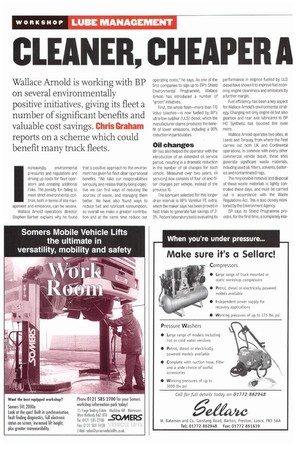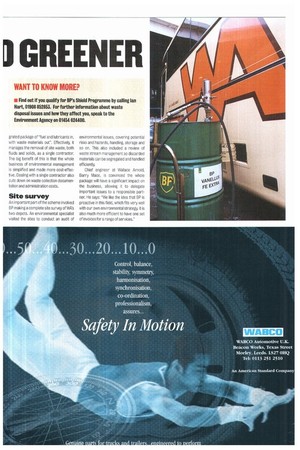CLEANER, CHEAPER A GREENER
Page 38

Page 39

If you've noticed an error in this article please click here to report it so we can fix it.
Wallace Arnold is working with BP on several environmentally positive initiatives, giving its fleet a number of significant benefits and valuable cost savings. Chris Graham reports on a scheme which could benefit many truck fleets.
ncreasingly, environmental pressures and regulations are driving up costs for fleet operators and creating additional risks. The penalty for failing to meet strict environmental controls, both in terms of site management and emissions, can be severe.
Wallace Arnold operations director Stephen Barber explains why he found that a positive approach to the environment has given his fleet clear operational benefits. "We take our responsibilities seriously, and realise that by being objective we can find ways of reducing the sources of waste, and managing them better. We have also found ways to reduce fuel and lubricant consumption, so overall we make a greater contribution and at the same time reduce our operating costs," he says. As one of the first companies to sign up to BP's Shield Environmental Programme, Wallace Arnold has introduced a number of "green" initiatives.
First, the whole fleet—more than 170 Volvo coaches—is now fuelled by BP's ultra-low-sulphur (ULS) diesel, which the manufacturer claims produces the benefit of lower emissions, including a 90% reduction in particulates.
Oil changes
BP has also helped the operator with the introduction of an extended oil service period, resulting in a dramatic reduction in the number of oil changes for each vehicle. Measured over two years, oil servicing now consists of four oil and filter changes per vehicle, instead of the previous 10.
The lubricant selected for this longer drain interval is BP's Vane!lus FE extra, which the maker says has been proved in field trials to generate fuel savings of 23%. Recent laboratory tests evaluating its performance in engines fuelled by ULS diesel have shown it to improve fuel economy, engine cleanliness and emissions by a further margin.
Fuel efficiency has been a key aspect for Wallace Arnold's environmental strategy. Changing not only engine oil but also gearbox and rear axle lubricants to BP HC Synthetic has boosted this even more.
Wallace Arnold operates two sites, at Leeds and Torquay, from where the fleet carries out both UK and Continental operations. In common with every other commercial vehicle depot, these sites generate significant waste materials, including used oil, filters, solvents, batteries and contaminated rags.
The responsible removal and disposal of these waste materials is tightly controlled these days, and must be carried out in accordance with the Waste Regulations Act. This is also closely monitored by the Environment Agency.
BP says its Shield Programme provides, for the first time, a completely inte grated package of "fuel and lubricants in, with waste materials out". Effectively, it manages the removal of site waste, both fluids and solids, as a single contractor. The big benefit of this is that the whole business of environmental management is simplified and made more cost-effective. Dealing with a single contractor also cuts down on waste collection documentation and administration costs.
Site survey
An important part of the scheme involved BP making a complete site survey of WA's two depots. An environmental specialist visited the sites to conduct an audit of environmental issues, covering potential risks and hazards, handling, storage and so on. This also included a review of waste stream management so discarded materials can be segregated and handled efficiently.
Chief engineer at Wallace Arnold, Barry Mace, is convinced the whole package will have a significant impact on the business, allowing it to delegate important issues to a responsible partner. He says: We like the idea that BP is proactive in this field, which fits very well with our own environmental strategy. It is also much more efficient to have one set of invoices for a range of services."












































































































